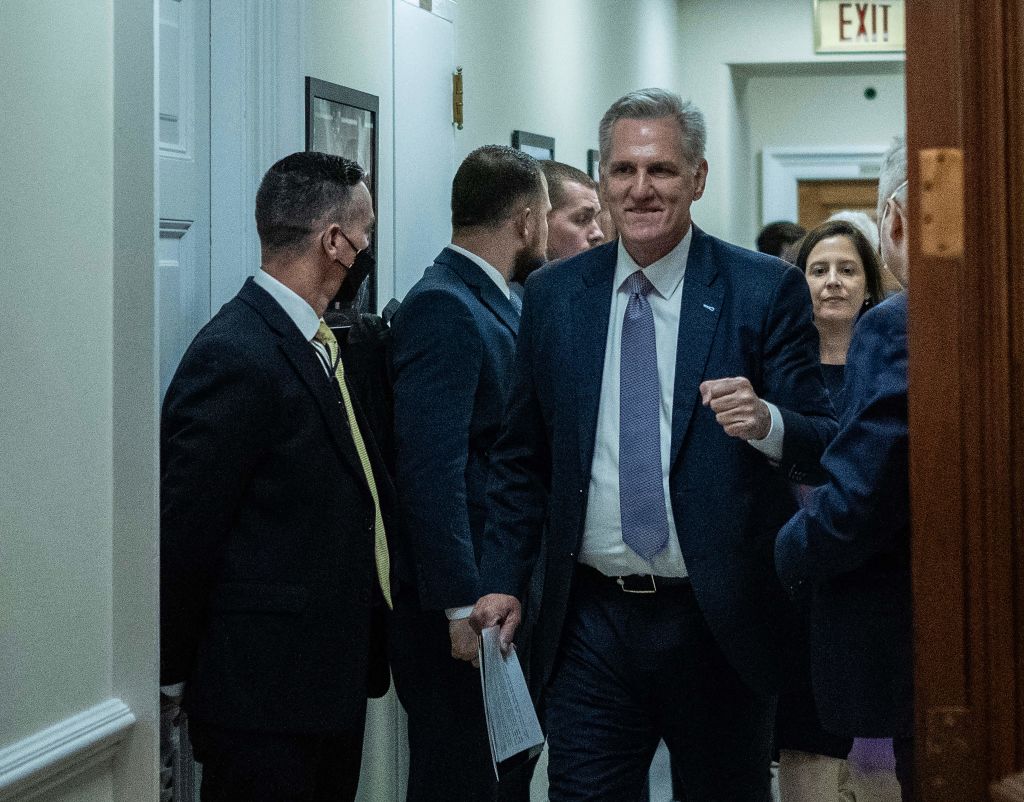Hello and happy Sunday! Yesterday was a pretty busy day in the Ohio bureau: We had family in town, and our kids had their homecoming dance. There were corsages to pick up, clothes to be ironed, and pictures to be taken. It was so busy, in fact, that it wasn’t until about 10 p.m. that I peeked at the news and realized that Congress had had a much busier day.
Somehow, Speaker Kevin McCarthy defied expectations—mostly by defying the handful of hardliners in his own party who were holding things up—and avoided a government shutdown. He worked with House Democrats to pass a continuing resolution, which will keep the government open for 45 days, by a vote of 335-91. It then passed the Senate 88-9.
The lights are on, national parks are open, and our military members and air traffic controllers won’t be working without pay. That’s the good news. But we’ll just be doing this all over again very soon, and it looks like there will be a bit of palace intrigue throughout the process.
Florida Rep. Matt Gaetz, the prickliest thorn in McCarthy’s side during his time as House speaker, said this morning that he will make good on his threat to offer a motion to vacate the speakership if McCarthy worked with Democrats to fund the government. Thing is, Gaetz is currently under investigation by the House Ethics Committee for all manner of misconduct, both personal and professional. Fox News’ Jacqui Heinrich tweeted that some House Republicans will move to expel Gaetz if the ethics committee “comes back with findings of guilt.”
I trust that the good folks at The Morning Dispatch are hard at work sorting all this out and will offer some excellent analysis tomorrow morning for you. Be on the lookout for that. In the meantime, we had some pretty good pieces you might have missed this week if you were busy keeping up with the shenanigans in Congress. Check them out.
Pro-lifers had been waiting for this moment for decades: On June 24, 2022, the Supreme Court’s Dobbs v. Jackson Women’s Health Organization decision overturned the half-century of federal protections for abortion rights afforded by Roe v. Wade. But that legal victory has not translated into fewer abortions, and the anti-abortion cause has suffered electoral defeats even in red states like Kansas, Kentucky, and Ohio. What the heck happened? In a deeply reported and well-thought out piece, Patrick T. Brown explains how the pro-life movement was caught off-guard in the wake of Dobbs. Three factors come into play: structural factors like media bias and progressive activism, a focus on a (necessary at the time) legal strategy over an electoral strategy, and “the ‘unbundling’ of the coalition to overturn Roe.” As Brown notes, “The egregiousness of Roe brought together the rightward-leaning legal movement, federalism-minded conservatives, and religious activists convinced of the moral value of the unborn child. … But with [the Dobbs decision], the different camps that came together to overturn Roe have effectively been unbundled.” What does the pro-life movement need now? “Ultimately, changing hearts about the morality of abortion is the most reliable way pro-life legislation will win over the long run—a task made more difficult when opponents of abortion are constantly on defense,” he writes.
The eyes of the diplomatic world are on negotiations between Saudi Arabia and Israel to establish normal relations, a potentially historic event. But the Saudis “in service to their reputation as the global leader of Islam” probably want to secure concessions for Palestinians in return for recognizing Israel. And the biggest hurdle might well be the “deteriorating legitimacy of Palestinian leadership, both among its own people and in the entire region.” In short, as Charlotte writes, it’s complicated. Iran-backed Hamas is basically in charge of Gaza, and the West Bank has long been ruled by the ineffective Palestinian Authority. Charlotte reports from Ramallah, where opposition to Palestinian Authority President Mahmoud Abbas comes from both Hamas and his own party, Fatah.
What does it say about the times we live in that a former president can casually muse about the idea that the outgoing chairman of the Joint Chiefs of Staff should be executed—for conducting a call with his Chinese counterpart to allay fears of a surprise attack to keep said former president in office? And that it doesn’t dominate national headlines? Nothing good, Nick writes in Boiling Frogs. “The public didn’t take that news in stride because Trump’s critics neglected to make a big deal about it,” he writes. “It’s more that Trump’s critics neglected to make a big deal about it because, with few exceptions, the public takes revelations of Trump’s corruption in stride.” What’s worse, he concludes, is that some assume that Trump’s inability to accomplish his most depraved desires in his first term means he wouldn’t be able to do so if reelected: “Shredding alliances, implementing Schedule F, staffing the Pentagon with cronies, persecuting ‘enemies of the people’ various and sundry—I’m not sure why anything would be off the table once he no longer needs to consider reelection. Courts will eventually intervene, but that’s just a different permutation of the same problem. What incentive would he have to obey court rulings in a second term?”
And here’s the best of the rest:
- President Biden and former President Trump have both made overtures to the striking United Auto Workers members, but Scott Lincicome makes the case in Capitolism that the union’s demands ignore economic reality. And don’t get him started on how the Biden administration’s push to elevate electric vehicles makes all of this more complicated.
- America has a long history of failed political parties, and neither the Democrats nor the Republicans are in particularly great shape right now. Should we be worried about the ramifications of one of the parties collapsing? Tevi Troy argues that we’re more likely to see an ongoing realignment between the parties than an outright implosion.
- A new Pew survey suggests that a majority of Americans are just fine with the decline of the nuclear family. Kay Hymowitz makes the case that that majority is just plain wrong, and she’s got a lot of data backing her up.
- The Dispatch Politics post-debate wrap-up looks at whether the onstage spat between Nikki Haley and Tim Scott is a sign of a larger conflict to come between them, and it also explores how that might shape the Republican primary.
- In his weekly column, Chris notes that America’s “resentment of notions of class and station common in Europe and many Asian cultures has been crucial to our nation’s capacity for dynamism and opportunity” but bemoans that we’ve become a classless society in a whole different meaning of the word.
- On the pods: Sarah is back on Advisory Opinions, and she and David French previewed the big cases the Supreme Court will take up this term. Also, should we even be paying attention to the Republican primary? Jonah and Steve can’t decide, so they welcomed Yuval Levin from AEI on to The Dispatch Podcast to sort it all out. And libertarian writer Brink Lindsey joins Jonah on The Remnant to discuss capitalism, social policy, and whether the libertarian project has failed.







Please note that we at The Dispatch hold ourselves, our work, and our commenters to a higher standard than other places on the internet. We welcome comments that foster genuine debate or discussion—including comments critical of us or our work—but responses that include ad hominem attacks on fellow Dispatch members or are intended to stoke fear and anger may be moderated.
With your membership, you only have the ability to comment on The Morning Dispatch articles. Consider upgrading to join the conversation everywhere.